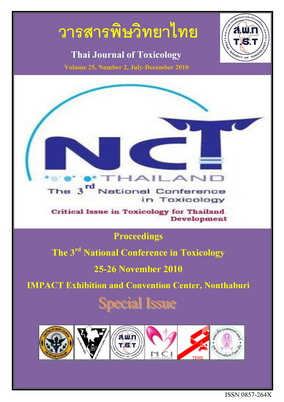Effects of Temperature, Time and Acidity on Stability of Permethrin in Blood
Main Article Content
Abstract
Permethrin is metabolized by hydrolysis via carboxylesterase in liver producing phenoxybenzyl alcohol. Since this enzyme also exists in blood, that may affect the accuracy of permethrin quantification. This study was aimed to determine the stability of permethin in blood sample. To investigate effects of temperature and time, blood samples were left at 25, 4 and -20ºC for 0, 0.5, 1, 2 and 4 h, respectively. Metabolic ratios for trans- and cis-permethrin increased when the time increased, and were the lowest at -20 ºC. Effects of trifluoroacetic acid (100: 1 and 200: 1) and HClO4 (50: 1, 100: 1, 200: 1, 225: 1 and 250: 1), and those of HClO4 (200: 1 and 225: 1) in combination with cooling the sample in ice showed thatadding HClO4 (200: 1) combining with cooling in ice resulted in the lowest metabolic ratio. In conclusion, sample preparing by adding acid and reducing the sample temperature are the optimum conditions to decrease the loss of permethrin before analysis.


